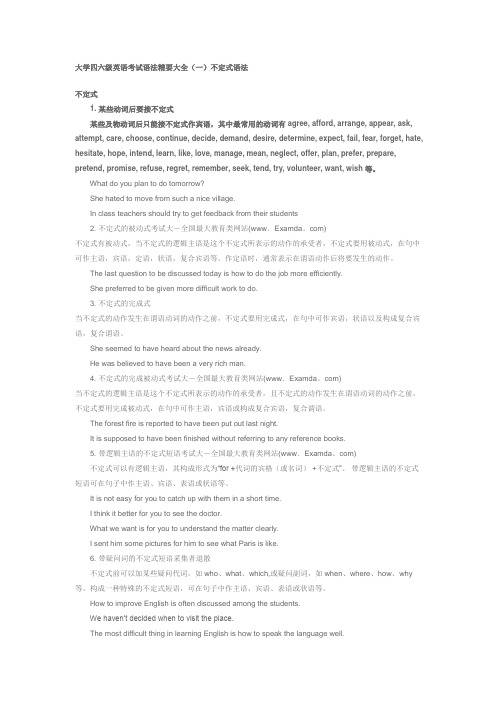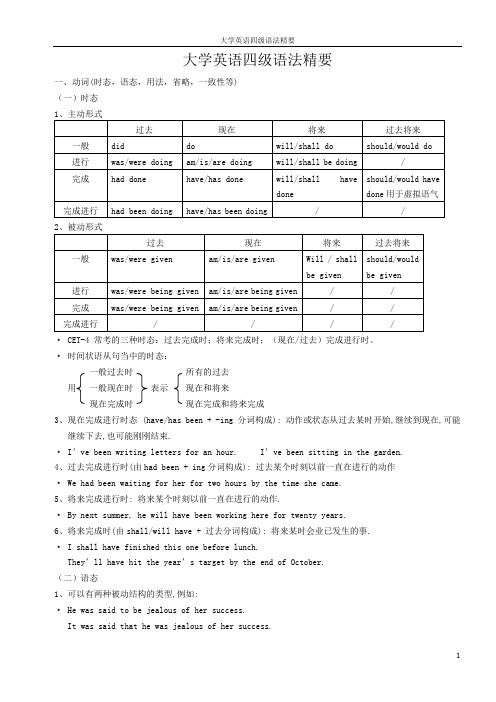大学英语四六级考试语法精要
四六级考试常考重点英语语法汇总

四六级考试常考英语语法一.定语从句引导定语从句的有关系代词as,who,whom,whom,which,that和关系副词when,where,why等。
1.as引导定语从句(1)as引导定语从句,相当于which。
如I am from shanghai,as/which you know。
但as引导的定语从句可以放在句首,而which不能;例:As you know,I am from shanghai。
}(2)as可作为关系代词来引导定语从句,既可以单独引导从句,又可以与主句中的the same 或such 相呼应,从句中的谓语动词常省略。
2.关系代词that与which用法区别:(1)which可以引导一个非限制性定语从句,that则不能;(2)which之前可以有介词,that之前则不能;(3)只能用that,而不能用which的主要情形:——当先行词是all,anything,few,little,much,none,nothing,something 等不定代词时;——当先行词被序数词或形容词最高级修饰时;——当先行词被the very,the only等词修饰时。
;例:Medical researchers are painfully aware that there are many problems to which they have not found solutions so far。
二.状语从句1. 让步状语从句(1)由no matter + wh-疑问词【no matter what】和wh-疑问词+ever 【whatever】。
但wh-疑问词+ever【whatever】引导的名词从句则不能用no matter替换。
Take the coat ,no matter what coat it is / whatever coat it is .(2)No matter whether…or…结构中可将no matter省略,形成whether…or…或whether…or not 引导选择条件句。
大学四六级英语考试语法精要大全

大学四六级英语考试语法精要大全(一)不定式语法不定式1. 某些动词后要接不定式某些及物动词后只能接不定式作宾语,其中最常用的动词有agree, afford, arrange, appear, ask, attempt, care, choose, continue, decide, demand, desire, determine, expect, fail, fear, forget, hate, hesitate, hope, intend, learn, like, love, manage, mean, neglect, offer, plan, prefer, prepare, pretend, promise, refuse, regret, remember, seek, tend, try, volunteer, want, wish等。
What do you plan to do tomorrow?She hated to move from such a nice village.In class teachers should try to get feedback from their students2. 不定式的被动式考试大-全国最大教育类网站(www.Examda。
com)不定式有被动式,当不定式的逻辑主语是这个不定式所表示的动作的承受者,不定式要用被动式,在句中可作主语,宾语,定语,状语,复合宾语等。
作定语时,通常表示在谓语动作后将要发生的动作。
The last question to be discussed today is how to do the job more efficiently.She preferred to be given more difficult work to do.3. 不定式的完成式当不定式的动作发生在谓语动词的动作之前,不定式要用完成式,在句中可作宾语,状语以及构成复合宾语,复合谓语。
大学英语四级重点语法精要

大学英语四级语法精要一、动词(时态,语态,用法,省略,一致性等)(一)时态2、被动形式· CET-4 常考的三种时态:过去完成时;将来完成时;(现在/过去)完成进行时。
·时间状语从句当中的时态:一般过去时所有的过去用一般现在时表示现在和将来现在完成时现在完成和将来完成3、现在完成进行时态 (have/has been + -ing 分词构成): 动作或状态从过去某时开始,继续到现在,可能继续下去,也可能刚刚结束.· I’ve been writing letters for an hour. I’ve been sitting in the garden.4、过去完成进行时(由had been + ing分词构成): 过去某个时刻以前一直在进行的动作· We had been waiting for her for two hours by the time she came.5、将来完成进行时: 将来某个时刻以前一直在进行的动作.· By next summer, he will have been working here for twenty years.6、将来完成时(由shall/will have + 过去分词构成): 将来某时会业已发生的事.· I shall have finished this one before lunch.They’ll have hit the year’s target by the end of October.(二)语态1、可以有两种被动结构的类型,例如:· He was said to be jealous of her success.It was said that he was jealous of her success.·能同时适用于上述两个句型的主动词通常都是表示“估计”,“相信”等意义的动词,常见的有:assume,believe,expect,fear,feel,know,presume,report,say,suppose,understand等。
四级语法重点

四级语法重点一、主谓一致主语与谓语在人称和数上要一致。
1. 单数主语+动词+s/ es例如:- The cat eats fish.(猫吃鱼。
)- He watches TV every day.(他每天看电视。
)2. 复数主语+动词(去除s/ es)例如:- The cats eat fish.(猫吃鱼。
)- They watch TV every day.(他们每天看电视。
)3. 主语为第三人称单数(he、she、it)时,动词要加s/ es 例如:- She reads a book.(她读一本书。
)- It rains heavily.(天下起了大雨。
)二、时态1. 一般现在时表示经常性动作或普遍事实。
肯定句:主语+动词原形(不加s/ es)例如:- I like swimming.(我喜欢游泳。
)否定句:主语+do/ does not +动词原形例如:- He does not like swimming.(他不喜欢游泳。
)疑问句:Do/ Does +主语+动词原形+其他?例如:- Do you like swimming?(你喜欢游泳吗?)2. 一般过去时表示过去某个时间发生的动作或状态。
肯定句:主语+动词过去式例如:- I ran in the park yesterday.(昨天我在公园里跑步。
)否定句:主语+did not +动词原形例如:- He did not eat dinner last night.(昨晚他没有吃晚饭。
)疑问句:Did +主语+动词原形+其他?例如:- Did you go to the cinema last week?(上周你去电影院了吗?)3. 一般将来时表示将要发生的动作或预测的事情。
肯定句:主语+will +动词原形例如:- We will have a meeting tomorrow.(明天我们将开会。
)否定句:主语+will not +动词原形例如:- She will not go to the party.(她不会去参加派对。
【引导】大学英语四六级考试语法精要

【关键字】引导大学英语四六级考试语法精要(一) 动名词1. 某些动词后要接动名词某些及物动词后能用动名词而不能用大概式作宾语,其中最常用动词的有admit, avoid, appreciate, complete, consider, delay, deny, dislike, enjoy, escape, excuse, fancy, finish, forgive, involve, imagine, can’t help,mind, miss, postpone, practise, prevent, quit, resent, risk, resist, suggest等。
She suggested spending another day in the mountain area. There’s no way to escape doing the work.Note:们①在need、want、require、deserve等动词后的动名词相当于大概式的被动式The clock needs/wants repairing. (=The clock needs/wants to be repaired)The disabled deserve respecting. (=The disabled deserve to be respected.)②在like、hate、prefer等动词后,,如果表示一般倾向,则用动名词作宾语;如果指具体的某次发生在将来的行动,则要用大概式。
I like reading books of this kind, but I don’t like to read that book.She prefers walking to cycling. I prefer to stay at home today.③在remember、forget、regret等动词后,如果用动名词作宾语,则表示该宾语的动作发生在动词谓语的动作之前;如果用大概式作宾语,则表示宾语的动作发生在动词谓语的动作之后I remembered locking the door. (=I remembered that I had locked the door.)I remembered to lock the door (=I remembered that I was to lock the door.)I regret telling you about it. (=I regret that I told you about it.)I regret to tell you he has fallen ill. (=I regret that I am to tell you he has fallen ill.)2. 动名词作介词的宾语动名词可作介词的宾语,与介词一起构成介词短语,在句中作定语、状语或表语。
英语四六级句型知识点

英语四六级句型知识点1.主语 + 谓语 + 宾语(SVO):这是英语中最基本的句型结构,如:She eats an apple.(她吃一个苹果。
)2.主语 + 谓语 + 间接宾语 + 直接宾语(SVOO):在这种句型中,直接宾语是动作的承受者,如:She gave me a book.(她给了我一本书。
)3.主语 + 谓语 + 宾语 + 宾语补足语(SVOC):这种句型中,宾语补足语用来补充说明宾语的特征、状态等,如:They made him captain.(他们任命他为队长。
)4.主语 + 系动词 + 表语(SVC):这种句型中,系动词用来连接主语和表语,表示主语的状态、特征等,如:He is a doctor.(他是一名医生。
)5.主语+ 谓语+ 宾语+ 宾语补足语+ 状语(SVOCAd):这种句型中,状语用来修饰动词、形容词、副词等,如:He left the room quietly.(他悄悄地离开了房间。
)6.主语 + 谓语 + 间接宾语 + 直接宾语 + 宾语补足语(SVOOVC):这种句型中,宾语补足语用来补充说明宾语的特征、状态等,如:The teacher asked the student to read the text aloud.(老师要求学生大声朗读课文。
)7.主语 + 谓语 + 宾语 + 宾语补足语 + 状语 + 定语(SVOCAdJ):这种句型中,定语用来修饰名词,如:The book on the table is mine.(桌上的书是我的。
)8.主语 + 谓语 + 宾语 + 宾语补足语 + 状语 + 定语+ 状语(SVOCAdJAd):这种句型中,状语用来修饰动词、形容词、副词等,如:He put the book carefully on the table.(他小心翼翼地把书放在桌子上。
)9.主语 + 谓语 + 不定式短语(SV Infinitive Phrase):这种句型中,不定式短语表示目的、原因等,如:He decided to study abroad.(他决定出国留学。
四六级语法知识点详解
四六级语法知识点详解英语四六级考试是大学英语水平考试的一种,对于很多学生来说,语法是其中一个比较难以掌握的部分。
本文将详细解释四六级考试中常见的语法知识点,帮助学生更好地应对考试。
一、时态和语态1. Simple Present Tense(简单现在时)简单现在时表示经常或习惯性发生的动作、真理、客观存在的事实等。
结构:主语 + 动词原形(第三人称单数在动词后加s或es)例句:I eat breakfast every morning.(我每天早上吃早餐)2. Present Continuous Tense(现在进行时)现在进行时表示现在正在进行的动作。
结构:主语 + am/is/are + 动词ing形式例句:She is studying in the library now.(她正在图书馆学习)3. Simple Past Tense(简单过去时)简单过去时表示过去某个时间发生的动作或存在的状态。
结构:主语 + 动词过去式例句:They visited their grandparents last weekend.(他们上周末去看望了他们的祖父母)4. Past Continuous Tense(过去进行时)过去进行时表示过去某个时间正在进行的动作。
结构:主语 + was/were + 动词ing形式例句:I was watching TV when she called me.(她打电话给我时,我正在看电视)5. Simple Future Tense(简单将来时)简单将来时表示将来要发生的动作或存在的状态。
结构:主语 + will + 动词原形例句:We will have a party next week.(我们下周要开个派对)6. Future Continuous Tense(将来进行时)将来进行时表示将来某个时间正在进行的动作。
结构:主语 + will be + 动词ing形式例句:I will be sleeping when you arrive.(当你到达时,我将正在睡觉)7. Passive Voice(被动语态)被动语态用于强调动作的承受者而不是施动者。
大学英语四六级翻译语法精要:比较级和最高级、名词性从句
大学英语四六级翻译语法精要:比较级和最高级、名词性从句Ⅷ比较级和最高级无比较级和最高级的形容词及副词: complete, perfect, utter, etc比较从句as…as, almost/just/nearly as…as, not so/as …as:We’ll give you as much help as we can.I haven’t made as much progress as I should.We’ve produced twice as much cotton this year as we did ten years ago.My command of English is not half so (as) good as yours.than, so much/a lot more than, no more… than, not more…than, less than more…than, less…than可表示“与其说…不如说…”:He is more good than bad.He was less hurt than frightened.The present crisis in capitalist countries is much more a political than an economic crisis.“no + 形容词或副词比较级 + than”所表示的可以是该形容词或副词的相反的含义:no rich than = as poor asno bigger than = as small asno later than = as early asJohn is no better than Tom.I have taken no more than six courses this semester.the more… the more (越是…就越…)Actually, the busier he is, the happier he feels.The more they talked, the more encouraged they felt.more of a, as much of a, less of a, etc: 当as much of a…as, more/less of a …than等结构与单数可数名词搭配时, 名词只能置于比较结构中间.He is more of a sportsman than his brother.Ⅸ名词性从句: 名词性从句包括主语从句, 宾语从句, 表语从句, 同位语从句.主语从句有三类:由what等代词引导的主语从句: what表示“…所…的(东西)”, 在结构上等于一个名词加一个定语从句; whatever表示“所…的一切”; whoever表示“一切…的人”.What you need is more practiceWhat is hard is to do good all one’s life and never do anything bad.Whatever was said here must be kept secret.Whatever I have is at your service.Whoever comes will be welcome.Whoever fails to see this will make a big blunder.由连词that引起的主语从句: 这类主语从句在大多数情况下都放到句子后部去, 而用代词it做形式上的主语:That we need more equipment is quite obvious.It is impossible that I may not able to come.It doesn’t seem likely that she will be here.在口语中连词that有时可以省略掉:It’s good you’re so considerate.It’s a pity you missed such a fine talk.由连接代词或连接副词(或whether)引起的主语从句: 这类主语从句, 也可以放到句子后部去, 前面用it做形式上的主语.When we shall have our sports meet is still a question.It is still a question when we shall have our sports meet.Whether he will join us won’t make too much difference.It won’t make too much difference whether he will join us.2宾语从句: 和主语从句及表语从句一样, 宾语从句也有以上三类.a) 连接代词或副词引导的从句只是在某些动词后能用作宾语.Tell me what you want.I just can’t imagine how he could have done such a thing.Have you decided whom you are to nominate as your candidate.能跟这类宾语从句的常见动词有: see, say, tell, ask, answer, know, decide, find out, imagine, suggest, doubt, wonder, show, discover, discuss, understand, inform, advise等. 这种动词后也常用whether或if引导的从与作宾语:I don’t know whether these figure are accurate.I’m wondering if the letter is overweight.这种从句有时前面可以有另一个宾语:Has she informed you when they are to hold the meeting?Please advise me which book I should read first.有时这种从句也可用作及词的宾语:Whether that is a good solution depends on how you look at it.He was not conscious of what an important discovery he had made.I was curious as to what he would say next.b) 用that引导的从句作宾语的情形最为普遍, 在很多动词如boast, say, think, insist, wish, hope, suppose, see, believe, agree, acknowledge, admit, deny, expect, explain, confess, order, command, suspect, dream, suggest, propose, know, mean, notice, prefer, request, require, report, urge, 以及doubt的否定和疑问式后面都可以用它.Ⅹ情态动词:may/might表示允许和可能:允许: 询问或说明一件事可不可以做.May I trouble you with a question?You may take this seat if you like.He asked if he might glance through my album.You might as well speak your mind. (比may…显得婉转一些)可能: 表示一件事或许发生(或是某种情况可能会存在).You may walk ten miles without seeing a house.She was afraid they might not like the idea.A bad thing might be turned to good account.might 表示请求:Might I ask for a photograph of your baby? (比May I …更客气一些)can’t, couldn’t表示否定的推测:She can’t be serious.A more suitable book can’t be found. (It is not possible to find a more suitable book.)He couldn’t (can’t) be over fifty.should, ought to: 表示应该做的事, ought to比should口气稍重一些.You should (ought to) do as he says.You shouldn’t (oughtn’t to) talk like that.但这两者间也有一些差别, 在表示责任, 义务等该做的事情时, 常用ought to, 在表示某件事宜于做时, 多用should, 在下面的句子中这两个词就不宜换用:You are his father. You ought to take care of him.We should not use too many big words in our everyday speech.will, wouldshall, should表示意愿情态动词后接进行式, 完成式和完成进行式:情态动词可以和动词的进行式构成谓语, 表示”应该正在…”, “想必正在…”这类意思: Why should we be sitting here doing nothing?This isn’t what I ought to be doing.She might still be thinking about the question you raised.They must (may) be waiting for us, let’s hurry up.They can’t be using the room now.情态动词有时和动词的完成形式构成谓语, 表示”应当已经…”, “想必已经…”这类意思:I should have thought of that.They shouldn’t have left so soon.She must have arrived by now.You needn’t have told them that.Where can (could) he have gone?He can’t have finished the work so soon.He may not have achieved all his aims. But his effort is praise-worthy.We ought to have give you more help.情态动词间或也可以和一个动词的完成进行式构成谓语,表示”应当一直在…”, “想必一直在…”这类意思:They are sweating all over. They must have been working in the fields.They may have been discussing the problem this morning.You should have been waiting for us. Why haven’t you?She couldn’t have been swimming all day.翻译预测1.Out of my expectation, _____________________________________.(经济危机给我的企业造成了如此巨大的冲击)2.Only through these measures, _______________________________.(我们能够赢得这场战斗)3.___________________(为了重建我们新的家园), we are hand in hand.4.Due to his negative behavior, ________________________________.(他总被视作团队中最不稳定的因素)5.______________________________________(如果你更早的意识到这个问题的严重性),you would not have been so regretful.。
四六级英语语法汇总
专四必备语法一、时态、语态时态、语态需要掌握的要点:1.表达将来时的形式:(1)在时间、条件、让步从句中,一般现在时代替将来时,但要注意区别从句的类型,如:I’ll tell him when you will ring again. 我告诉他你什么时候再来电话。
(宾语从句)比较:I’ll tell him when you ring again.你再打电话时我告诉他。
(状语从句)(2)在make sure, make certain, see (to it) 后的that从句中,谓语动词用一般现在时代替将来时,如:See to it that you include in the paper whatever questions they didn’t know the answer to last time.(include 不能用will include或其他形式) 2.完成时是时态测试的重点,注意与完成时连用的句型和时间状语:(1)by/between/up to/till +过去时间、since、by the time/when +表示过去发生情况的从句,主句用过去完成时。
如:We had just had our breakfast when an old man came to the door.Between 1897 and 1919 at least 29 motion pictures in which artificial beings were portrayed had been produced.(表示1919年时已发生的情况) (2)by +将来时间、by the time/ when +谓语动词是一般现在时的从句,主句用将来完成时。
如:By the time you arrive in London, we will have stayed in Europe for two weeks.I hope her health will have improved greatly by the time we come back next year.(3)by now、since +过去时间、in/during/for/over/the past/last few(或具体数字)years/days/months,主句用现在完成时, 但在it is +具体时间since/before这一句型中,主句更多的时候不用完成时。
大学英语4级语法笔记
大学英语4级语法笔记
1. 主谓一致
- 主语和谓语在人称和数上保持一致。
- 当主语是单数第三人称时,谓语动词要加s。
- 当主语是复数时,谓语动词不加s。
2. 动词时态
- 一般现在时:表示经常性或惯性的动作。
- 现在进行时:表示现在正在进行的动作。
- 一般过去时:表示过去某个时间发生的动作。
- 过去进行时:表示过去某一段时间内正在进行的动作。
- 现在完成时:表示过去某个时间发生的动作对现在造成的影
响或结果。
- 过去完成时:表示过去某个时间发生的动作对过去的另一个
时间或动作造成的影响或结果。
3. 形容词和副词的比较级和最高级
- 比较级:注意形容词和副词在比较级前面要加上more或less。
- 最高级:注意形容词和副词在最高级前面要加上the most或the least。
4. 名词所有格
- 表示属于关系时,在名词后面加's。
- 表示复数名词所有格时,在名词后面加'。
5. 祈使句和感叹句
- 祈使句表示命令、请求或建议,一般用动词原形。
- 感叹句表示惊讶、赞叹等情感,常以What、How等引导。
6. 介词的用法
- 介词用于表示位置、时间、方式等关系。
- 常用的介词有in、on、at、under、over等。
以上是大学英语4级语法的一些基础知识点,请在学习和写作时注意运用。
- 1、下载文档前请自行甄别文档内容的完整性,平台不提供额外的编辑、内容补充、找答案等附加服务。
- 2、"仅部分预览"的文档,不可在线预览部分如存在完整性等问题,可反馈申请退款(可完整预览的文档不适用该条件!)。
- 3、如文档侵犯您的权益,请联系客服反馈,我们会尽快为您处理(人工客服工作时间:9:00-18:30)。
大学英语四六级考试语法精要大学英语四六级考试是很多大学生必须面对的一道难题。
而在
这一场考试中,语法是必不可少的一部分。
在考试中,学生需要
掌握一定的语法知识,才能够在短时间内迅速完成题目,拿到高分。
接下来,我们将带领大家了解大学英语四六级考试语法精要。
一、基础语法
在大学英语四六级考试中,基础语法是最为重要的一部分。
学
生需要掌握英语的基本语法规则,如名词、动词、形容词、副词、代词、冠词、介词、连词、关系词等。
通过学习这些基础知识,
能够提高学生的语言水平,更好地理解和应用英语。
二、时态语态
时态和语态是大学英语四六级考试中常考的语法知识点。
在时
态方面,学生需要掌握英语中的12个基本时态及其用法。
在语态
方面,学生需要重点学习被动语态的构成和使用方法。
三、虚拟语气
虚拟语气也是大学英语四六级考试中经常出现的语法知识点。
学生需要掌握虚拟语气的用法,如虚拟语气的条件句、假设句、
愿望句、建议句、命令句等等。
学会使用虚拟语气,有助于提高
学生的写作和口语表达能力。
四、强调句式
强调句式也是大学英语四六级考试中经常考察的语法知识点。
学生需要掌握强调句式的构成和使用方法,如It is…that句型、What…句型、Who…句型、Which…句型等等。
掌握了这些强调句式,学生可以更好地表达自己的观点和想法,并增加表达的说服力。
五、倒装句
在大学英语四六级考试中,倒装句也是一个重要的语法知识点。
倒装句的构成和使用方法需要学生认真掌握,尤其是英语中的部
分倒装和完全倒装。
学会使用倒装句,不仅可以提高作文和口语
表达的技巧,还可以让语言更加生动有趣。
综上所述,大学英语四六级考试语法精要包括基础语法、时态语态、虚拟语气、强调句式和倒装句等多个方面。
掌握这些语法知识点,不仅可以在考试中得到高分,还可以提高学生的英语水平,进一步提高在英语交流中的自信和表达能力。
